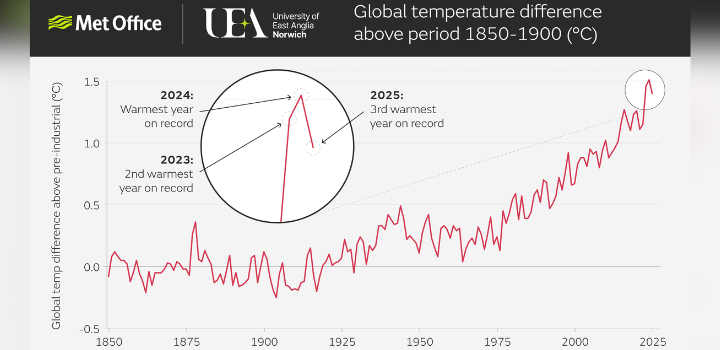New climate report finds time running out to save the Fens
By: Communications

New research highlights the threat to one of the UK’s most vital agricultural and ecological regions from climate change floods, droughts and biodiversity collapse.
The groundbreaking Fens Climate Change Risk Assessment (CCRA) was carried out by the Tyndall Centre for Climate Change Research at the University of East Anglia, in collaboration with Sayers and Partners and the UK Centre for Ecology and Hydrology, and shows the complex challenges posed to the Fens because of rising temperatures, sea level rise, and escalating climate risks.
The lowland coastal plain faces intensified flooding, severe droughts, biodiversity loss, and drastic disruptions to agriculture. These findings show that the time for coordinated, region-specific strategies to adapt to these challenges is now.
Key projections include:
• Heightened flood risks, more extreme weather events, changes in agricultural productivity due to limited water availability, and accelerating biodiversity loss between the 2030s and 2050s with 2°C warming, expected to occur if high CO2 emissions continue as predicted.
• By the 2050s to 2070s, with 2.2-3.4°C warming, major flooding events, severe droughts, and rising sea levels could critically threaten infrastructure and communities. Water scarcity will jeopardise the agricultural sector, while biodiversity losses may become irreversible.
• Without aggressive emission reductions, a 4°C rise by 2100 will see a profound increase in the severity and frequency of flood events, large-scale ecosystem collapse, and rendering parts of the Fens uninhabitable and unviable for businesses, including food production.
Dr Katie Jenkins, lead researcher on the report, said: “This assessment shows that the Fens cannot face the climate crisis with isolated measures. The challenges are interconnected, and the solutions must be as well. This report lays the foundation for coordinated, meaningful action.”
The Fens, encompassing some of the UK’s most valuable agricultural land, critical biodiversity, and a growing population, require a holistic, integrated approach. The Future Fens Integrated Adaptation (FFIA) programme embodies this, bringing together key partners such as the Environment Agency, Water Resources East, the Peterborough and Cambridge Combined Authority, Lincolnshire County Council, and Norfolk County Council. This collaboration is essential for adapting to the mounting challenges detailed in the assessment.
As the report underscores, climate action in the Fens cannot wait. Sea levels will continue to rise for decades and centuries, regardless of mitigation efforts. Now is the window of opportunity to establish a resilient and adaptive future for the Fens – a future driven by coordinated strategies and robust investments.
This place-based assessment serves not only as a critical call to action but as a guiding roadmap for stakeholders and decision-makers to safeguard the region’s future.
“We’ve long been preparing for climate change impacts, particularly in the Fens, which hosts some of the UK’s most vital agricultural land,” said Dr Robin Price, Director of Quality and Environment for Anglian Water. “At Anglian Water, we’ve proposed over £218 million in investment for the Fens as part of our 2025-30 business plan, currently under Ofwat’s review. This includes work on a strategic pipeline to move water from wetter to drier areas, like the Fens, and plans for a new reservoir near Chatteris to supply drinking water to 250,000 homes.
“Securing climate resilience in the Fens demands collaboration across local authorities, businesses, community groups, and regulators – highlighting the importance of the Future Fens: Integrated Adaptation partnership. We hope this report serves as a rallying call to unite partners and ensure a thriving future for the region.”
Unlike national assessments, this location-specific CCRA provides targeted analysis and tailored solutions unique to the Fens. Doing so offers a critical foundation for adaptive strategies that can be refined and implemented at both local and regional levels, driving forward the vision of a resilient, sustainable Fens for generations to come.
Amy Shaw, Fens Flood Risk Manager at the Environment Agency, added: “The Fens Climate Change Risk Assessment’s comprehensive findings underscore the urgent need to address the challenges posed by climate change in the Fens – a landscape largely below sea level and exposed to flood risk from the sea, rivers, groundwater, and surface water.
“Our Fens 2100+ programme is our response to this challenge. This partnership brings together flood risk management authorities and representatives from agricultural communities to develop a fens-wide flood resilience investment strategy, enabling this unique landscape to adapt to the impacts of climate change now and into the future.”
• Find out more about the Future Fens Integrated Adaptation (FFIA) project
Related Articles

New analysis of climate threats to biodiversity will help conservationists plan for future
Scientists have published the most comprehensive assessment to date of how climate change threatens biodiversity in more than 98,000 protected areas worldwide, aiming to help conservationists build resilience in the face of accelerating climate impacts.
Read more
Scientists discover how fast the world’s deltas are sinking
New research involving the University of East Anglia (UEA) reveals how fast the world’s deltas are sinking and the human-driven causes.
Read more
2025 continues series of world’s three warmest years
2025 is the third warmest year on record in a series from 1850, following 2024 and 2023, according to new data released today.
Read more